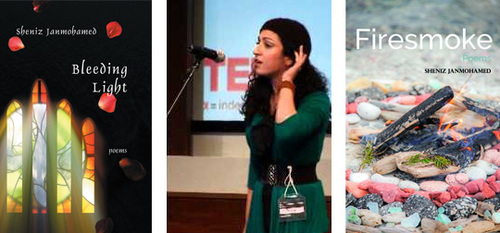Sheniz Janmohamed (2006 Cohort)
 I keep a chunk of quartz on my desk—a reminder to observe from all angles, to deepen, clarify, and sharpen the edges of my words.
I keep a chunk of quartz on my desk—a reminder to observe from all angles, to deepen, clarify, and sharpen the edges of my words.
A few days ago, while I was gazing into my quartz (not writing, of course), I remembered. I remembered David Young telling us that he kept a chunk of amber on his desk to inspire him during the writing process. He encouraged us to keep something magical, weird and unique on our desks.
I’m not sure when I picked up his advice, but there it was—something magical, weird and unique—right in front of me.
On the first day of playwriting class, David lay down on the floor, took off his shoes to reveal multi-coloured striped socks, and read from his play with his feet up in the air. All the stress I felt about writing a play faded away in that moment. He created a safe space by being silly. He created a safe space by inviting us to his home to nibble on expensive crackers and cheese, while he casually introduced us to Bruce MacDonald, Atom Egoyan and other luminaries, who joined us in honing our work. He opened his door and his heart to us—sharing his vulnerabilities, challenges and triumphs as a writer. It was a pivotal class for me because it stripped away at the romanticism of being a writer and gave way for the deeper work of understanding what it takes to work as a writer.
 Janice Kulyk Keefer invited us to write and share our stories around hot cups of tea and bowls of fruit. I still remember one frigid day when I walked to class with a very pregnant Soraya Peerbaye next to me, as we chatted about the challenges of writing as women of colour. These bonds of community are still strong.
Janice Kulyk Keefer invited us to write and share our stories around hot cups of tea and bowls of fruit. I still remember one frigid day when I walked to class with a very pregnant Soraya Peerbaye next to me, as we chatted about the challenges of writing as women of colour. These bonds of community are still strong.
Dionne Brand taught us poetry from all traditions, including the ghazal as an English form. My first ghazal was one of the worst pieces of writing I have ever produced. I wish I still had it—I would frame it as a reminder. Despite my atrocious ghazal, Dionne encouraged me to keep writing. I worked at the craft, researched it under the mentorship of the late Kuldip Gill, and produced my first book, Bleeding Light, as a result of my studies in the form. I have built my writing career around the ghazal—both of my poetry books have been written in the ghazal form. I’ve taught the ghazal, performed it, collaborated with musicians because of it. In 2012, I was invited to the Jaipur Literature Festival to speak about writing the ghazal in English. My entire life’s work as been a result of Dionne Brand nudging me to pursue the ghazal. To say I owe her would be an understatement.
The impact of these experiences is undeniable—instead of just reading about writers, I was sitting with them. Talking to them. Breathing the same air. Instead of signing books, they scribbled notes on my crappy poems and condemned my mediocre stories. They shared their lived experiences, tidbits of advice, and living rooms with us. Now, when I step into classrooms, I bring those precious teachings with me. I see my experience through the lens of the mentors who have taught me, and try, in my own way, to give back what they have given me.
Sheniz Janmohamed is an author, artist educator and spoken word artist. She has performed nationally and internationally for over 10 years, including features at the TedXYouth Conference (Toronto, 2010) the Jaipur Literature Festival (Jaipur, 2013) and the Aga Khan Museum (Toronto, 2015). Her first book, Bleeding Light (Mawenzi House, 2010), is a collection of English ghazals that explores a woman’s journey through night. Sheniz’s second collection of poetry, Firesmoke (Mawenzi House, 2014) traces the inception and annihilation of sacred fire and explores the meaning of truth and the self, finding them both in form and emptiness. Sheniz also visits schools through Mariposa in the Schools and the League of Canadian Poets, and has travelled as far as Nairobi, Kenya, to share her poetry with young audiences. She is also a Mentor-Artist with the Royal Conservatory’s Digital Media Arts program.
[featured: spring 2017]
Website: www.shenizjanmohamed.com
Audio: Sheniz Janmohamed on Soundcloud
Poetry: The Rusty Toque
Essay: Montreal Serai